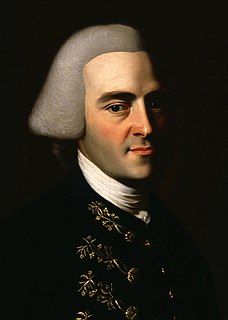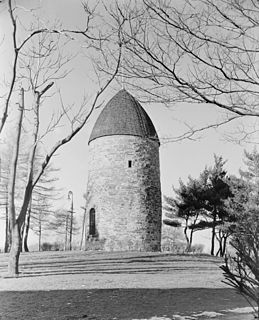
John Hancock was an American merchant, statesman, and prominent Patriot of the American Revolution. He served as president of the Second Continental Congress and was the first and third Governor of the Commonwealth of Massachusetts. He is remembered for his large and stylish signature on the United States Declaration of Independence, so much so that the term "John Hancock" has become a synonym in the United States for one's signature.

Paul Revere was an American silversmith, engraver, early industrialist, and Patriot in the American Revolution. He is best known for his midnight ride to alert the colonial militia in April 1775 to the approach of British forces before the battles of Lexington and Concord, as dramatized in Henry Wadsworth Longfellow's poem, "Paul Revere's Ride" (1861).

The Boston Massacre, known as the Incident on King Street by the British, was a confrontation on March 5, 1770, in which British Army soldiers shot and killed several people while under harassment by a mob. It was heavily publicized by leading Patriots, such as Paul Revere and Samuel Adams, to encourage rebellion against the British authorities. British troops had been stationed in Boston, capital of the Province of Massachusetts Bay, since 1768 in order to protect and support crown-appointed colonial officials attempting to enforce unpopular Parliamentary legislation.

Thomas Hutchinson was a businessman, historian, and a prominent Loyalist politician of the Province of Massachusetts Bay in the years before the American Revolution. He has been referred to as "the most important figure on the loyalist side in pre-Revolutionary Massachusetts." He was a successful merchant and politician, and was active at high levels of the Massachusetts government for many years, serving as lieutenant governor and then governor from 1758 to 1774. He was a politically polarizing figure who came to be identified by John Adams and Samuel Adams as a proponent of hated British taxes, despite his initial opposition to Parliamentary tax laws directed at the colonies. He was blamed by Lord North for being a significant contributor to the tensions that led to the outbreak of the American Revolutionary War.

General Thomas Gage was a British Army general officer and colonial official best known for his many years of service in North America, including his role as British commander-in-chief in the early days of the American Revolution.

The Governor of Massachusetts is the head of the executive branch of the Government of Massachusetts and serves as commander-in-chief of the Commonwealth's military forces. The current governor is Charlie Baker.

Thomas Cushing III was an American lawyer, merchant, and statesman from Boston, Massachusetts. Active in Boston politics, he represented the city in the provincial assembly from 1761 to its dissolution in 1774, serving as the lower house's speaker for most of those years. Because of his role as speaker, his signature was affixed to many documents protesting British policies, leading officials in London to consider him a dangerous radical. He engaged in extended communications with Benjamin Franklin who at times lobbied on behalf of the legislature's interests in London, seeking ways to reduce the rising tensions of the American Revolution.

Roger Wolcott was a Republican lawyer and politician from Massachusetts. He was Lieutenant Governor of Massachusetts from 1893 to 1897, becoming Acting Governor in 1896 upon the death of Governor Frederic T. Greenhalge. He was elected governor in his own right in 1897, serving until 1900. He was a leading figure in the Young Republican Club, which revitalized the Massachusetts Republican Party in the 1890s.

The Longfellow House–Washington's Headquarters National Historic Site is a historic site located at 105 Brattle Street in Cambridge, Massachusetts. It was the home of noted American poet Henry Wadsworth Longfellow for almost 50 years, and it had previously served as the headquarters of General George Washington (1775-76).

Elmwood, also known as the Oliver-Gerry-Lowell House, is a historic house and centerpiece of a National Historic Landmark District in Cambridge, Massachusetts. It is known for several prominent former residents, including: Thomas Oliver (1734–1815), royal Lieutenant Governor of Massachusetts; Elbridge Gerry (1744–1814), signer of the US Declaration of Independence, Vice President of the United States and eponym of the term "gerrymandering"; and James Russell Lowell (1819–1891), noted American writer, poet, and foreign diplomat.

Moses Gill was a Massachusetts politician who briefly served as the state's Acting Governor. He is the state's only acting governor to die in office. A successful businessman, he became one of the leading settlers of Princeton, Massachusetts, entering politics shortly before the American Revolutionary War. He served on the Massachusetts Provincial Congress's executive committee until the state adopted its constitution in 1780, after which he continued to serve on the state's Governor's Council.

The Hutchinson Letters Affair was an incident that increased tensions between the colonists of the Province of Massachusetts Bay and the British government prior to the American Revolution. In June 1773 letters written several years earlier by Thomas Hutchinson and Andrew Oliver, governor and lieutenant governor of the province at the time of their publication, were published in a Boston newspaper. The content of the letters was propagandistically claimed by Massachusetts radical politicians to call for the abridgement of colonial rights, and a duel was fought in England over the matter.

Tory Row is the nickname historically given by some to the part of Brattle Street in Cambridge, Massachusetts where many Loyalists had mansions at the time of the American Revolutionary War, and given by others to seven Colonial mansions along Brattle Street. Its historic buildings from the 18th century include the William Brattle House and the Longfellow House–Washington's Headquarters National Historic Site. Samuel Atkins Eliot, writing in 1913 of the seven Colonial mansions making up Tory Row, called the area "not only one of the most beautiful but also one of the most historic streets in America."

Brattle Street in Cambridge, Massachusetts, called the "King's Highway" or "Tory Row" before the American Revolutionary War, is the site of many buildings of historic interest, including the modernist glass-and-concrete building that housed the Design Research store, and a Georgian mansion where George Washington and Henry Wadsworth Longfellow both lived Samuel Atkins Eliot, writing in 1913 about the seven Colonial mansions of Brattle Street's "Tory Row," called the area "not only one of the most beautiful but also one of the most historic streets in America." "As a fashionable address it is doubtful if any other residential street in this country has enjoyed such long and uninterrupted prestige."
Sir Thomas Shirley, 1st Baronet was a British colonial governor and military officer. The son of William Shirley, a politically well-connected colonial administrator who served for many years as governor of the Province of Massachusetts Bay, Shirley entered the military, serving in the Louisbourg expedition his father organised in 1745. During the Seven Years' War he served on Menorca and in the 1761 Capture of Belle Île.

William Brattle was the Attorney General of Province of Massachusetts Bay as well as a physician, the Major General for all of the militia in Massachusetts Bay (1771), a selectmen for Cambridge for 14 years and politician in the Massachusetts House of Representatives. During the American Revolution, he was Major General of the Royal Militia and played a role in the Powder Alarm. He was known as "the wealthiest man" in Massachusetts and was buried in an unmarked grave in Halifax, Nova Scotia. Lorenzo Sabine said of him, "A man of more eminent talents, and of greater eccentricities, has seldom lived."























